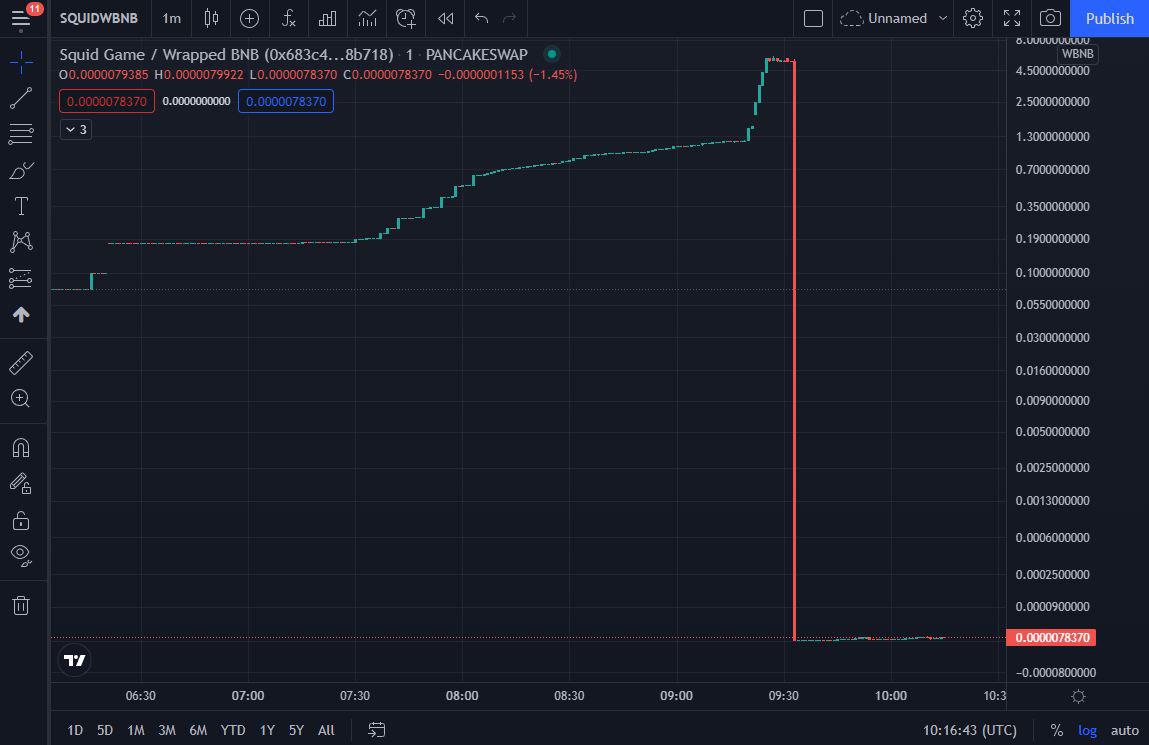The Squid Game Crypto Scam: A Deceptive Play-to-Earn Nightmare
- 06 Jan 2025

Introduction: The Rise of a Crypto Scam
In the world of cryptocurrency, where opportunities for wealth and innovation abound, scams have become a recurring dark side. One of the most notorious scams in recent memory was the Squid Game cryptocurrency scam. The fraudsters behind this scheme exploited the global phenomenon of Netflix's Squid Game, luring thousands of investors into a web of lies and deceit.
By the time the scam unraveled, the developers had disappeared with an estimated $3.38 million, leaving thousands of investors reeling from the financial and emotional fallout. This article examines the anatomy of the scam, the factors that enabled it, and the critical lessons every investor must learn.
The SQUID Token: A Scam is Born
Launched in October 2021, the SQUID token claimed to be the official cryptocurrency for an upcoming play-to-earn game inspired by Squid Game. With promises of a game where participants could compete for rewards in the same vein as the survival challenges depicted in the show, the project quickly gained traction.
The Promise of SQUID:
The SQUID token promised a series of games that mirrored the TV show's plot. Participants would need to pay in SQUID tokens to enter each round, with the promise of earning even more tokens as they progressed. The final prize, according to the developers, would be substantial.
A Meteoric Rise
In the weeks following its launch, the SQUID token experienced a meteoric rise, with its value skyrocketing by over 2300% in just a few days. Investors, driven by the fear of missing out (FOMO) and captivated by the Squid Game theme, flocked to buy the token.
The token’s price hit an all-time high of $2,861 on November 1, 2021. By then, the developers had amassed millions of dollars in liquidity, and their true intentions became clear.

The Red Flags Investors Ignored
While the project gained significant attention, it was riddled with warning signs that many investors overlooked.
1. Inability to Sell:
Investors quickly discovered that selling their SQUID tokens was impossible due to an anti-sell mechanism. This so-called feature was promoted as a safeguard against price manipulation, but in reality, it trapped investors, preventing them from liquidating their holdings.
The "anti-dumping mechanism" required buyers to hold Marbles, another token that wasn’t fully integrated into the project. This convoluted setup should have raised concerns.
2. Lack of Transparency:
The project's website and whitepaper were riddled with grammatical errors, inconsistencies, and vague promises. The developers’ identities were hidden, and no verifiable information was available about the team or partnerships.
3. False Associations:
The project misleadingly associated itself with Netflix’s Squid Game, despite having no official connection to the streaming giant or the show’s creators. This misrepresentation was a major red flag.
4. Media Hype Without Verification:
The SQUID token gained coverage in mainstream media, including platforms like CNBC and the BBC, which reported on the token's surge without thoroughly investigating its legitimacy. This added an air of legitimacy to the project, inadvertently attracting more investors.
The Rug Pull: A Swift Collapse
On November 1, 2021, the developers executed what is commonly referred to as a rug pull. This is a scam where developers withdraw all liquidity from a token, leaving investors with worthless assets.
Within minutes, the SQUID token's price plummeted from $2,861 to near zero.
How the Rug Pull Worked:
- The developers drained liquidity from the token, converting the invested funds into their wallets.
- They disappeared, shutting down the project's website and all associated social media accounts.
- Investors were left with tokens they couldn’t sell, watching their investments vanish.
Financial and Emotional Fallout
- Losses: The developers made off with an estimated $3.38 million. Many investors reported losing their life savings or substantial sums of money.
- Emotional Impact: Victims expressed feelings of betrayal and frustration. For many, this was their first foray into cryptocurrency, leaving them disillusioned.

The Aftermath: Unpacking the Scam
The SQUID token scam sparked widespread discussion about the risks inherent in the cryptocurrency market. It highlighted systemic issues, including lack of regulation, investor naivety, and the ease with which bad actors can exploit trends.
Broader Implications:
1. Cryptocurrency Scams on the Rise:
The SQUID scam was part of a broader trend of "rug pulls" and fraudulent crypto projects that plagued the market in 2021 and beyond.
2. The Role of Media:
Mainstream media’s failure to vet the project before reporting contributed to the hype. It serves as a cautionary tale for journalists to exercise due diligence.
3. Regulatory Scrutiny:
The incident spurred discussions around the need for tighter regulations in the crypto space to protect retail investors from fraudulent schemes.
Lessons from the Squid Game Crypto Scam
For those who lost money in the SQUID scam, the experience serves as a painful reminder of the importance of vigilance. For others, it’s an opportunity to learn how to avoid similar pitfalls in the future.
For an in-depth guide on protecting yourself from scams, check out our article on How to Avoid Crypto Scams.
1. Always Conduct Due Diligence
Before investing in any cryptocurrency, research the project thoroughly. Key aspects to examine include:
- The team behind the project: Are they public and verifiable?
- The whitepaper and roadmap: Are they detailed and realistic?
- The community: Does the project have genuine engagement on platforms like Discord and Twitter?
2. Be Wary of Unrealistic Promises
Scammers often lure investors with promises of guaranteed returns or unprecedented growth. In the case of the SQUID token, the rapid price surge was a clear indicator of speculative hype rather than sustainable growth.
3. Understand the Technology
Familiarize yourself with how blockchain and cryptocurrencies work. Knowledge of basic concepts like liquidity pools, anti-dumping mechanisms, and smart contracts can help you spot red flags.
4. Avoid FOMO
Fear of missing out (FOMO) is a powerful driver of bad investment decisions. Take a step back, assess the project rationally, and avoid investing based on hype alone.
5. Recognize Red Flags
Be on the lookout for:
- Anonymous developers
- Poorly written whitepapers
- Complex mechanisms to withdraw funds
- Overreliance on marketing rather than substance
The Path Forward: Creating a Safer Crypto Environment
The Squid Game cryptocurrency scam highlighted the need for education, regulation, and community vigilance in the crypto space.
1. Investor Education
Platforms like CoinMarketCap and Binance Academy are working to educate investors on identifying scams. Knowledge is the first line of defense.
2. Enhanced Regulation
While crypto is decentralized, governments and organizations are pushing for regulations to protect retail investors. Proposed measures include mandatory KYC for project developers and stricter oversight of token launches.
3. Community Reporting
The crypto community plays a vital role in flagging suspicious projects. Forums, subreddits, and social media channels often serve as early warning systems.

Conclusion: A Hard Lesson for Investors
The Squid Game cryptocurrency scam serves as a stark reminder of the risks in the crypto market. While innovation continues to drive the industry forward, it also opens the door to bad actors seeking to exploit unsuspecting investors.
By conducting thorough research, staying vigilant, and recognizing red flags, investors can protect themselves and contribute to a safer crypto environment. The lessons learned from the SQUID scam are invaluable as we navigate the evolving landscape of digital assets.





